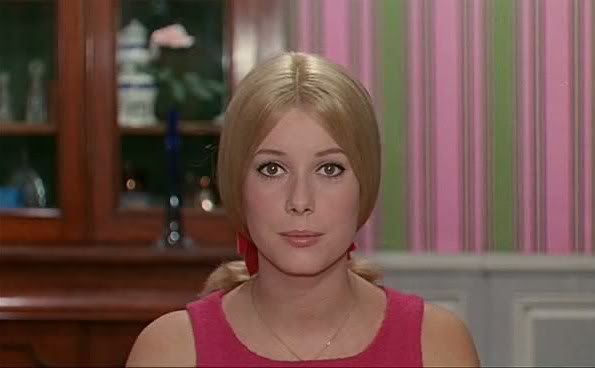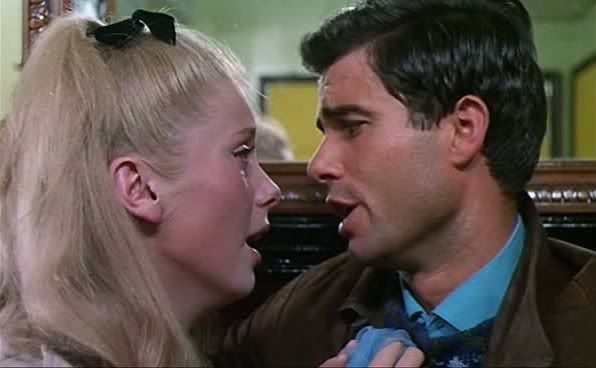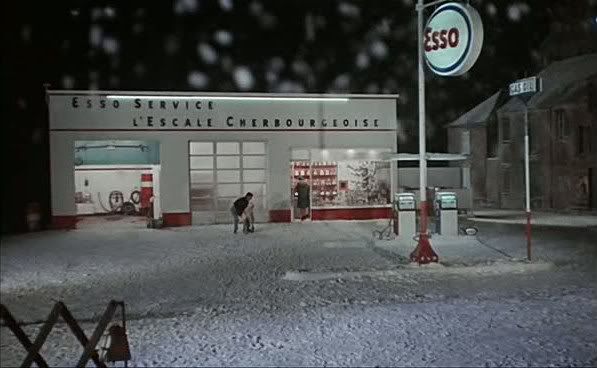
The Umbrellas of Cherbourg is one of the most moving and heartbreaking love stories in the cinema, an absolutely stunning musical masterpiece that sets its bright, colorful visual palette and sweet, soaring music against an increasingly bittersweet emotional range. Divided into three parts — departure, absence, and return — Jacques Demy's sublime musical is the story of a love affair haunted by the separation of war. Geneviève (Catherine Deneuve) is a young girl madly in love with the mechanic Guy (Nino Castelnuovo), but their sweet, innocent affair is torn apart when Guy is called up into the army, sent to Algeria for two years. As in so many French films of this era, Algeria looms large, a tear in the fabric of life, an absence that's felt at home in the missing young men, the years of longing and waiting.
The film is an interesting type of musical in which every single line is sung, but it rarely feels like there's a proper song: instead, all of the dialogue is more-or-less naturalistic speech that's simply sung instead of spoken. Even the most banal lines, like Guy's interactions with customers and his boss at the gas station where he works, are liltingly timed to Michel Legrand's alternately jazzy and romantic music. This style can be somewhat distracting and artificial at first but it quickly comes to seem as natural as if the characters were simply speaking. By setting everything to song, it never seems as if the music is interrupting the diegesis, cutting off the naturalistic flow of life with a musical number. Rather, life itself, with all its joys and tragedies, its banal incidents, its great loves and great sadnesses, has been transformed into one big musical number, a 90-minute musical number that encompasses both the innocent sweetness of young love and the much more complex, melancholy, mysterious loves and losses that build up over the course of the years.
The first part of the movie, which is almost saccharine-sweet with its constant tender embraces and cooing declarations of love, ends with Guy and Geneviève being split apart as he heads off to the army and the war. At one point during their goodbyes, he says that he knows she'll wait for him, but Demy films it in a way that suggests exactly the opposite. Before that point, he'd captured the young lovers in a two-shot, huddling together in a booth at a bar, but then Demy pans right to focus on Guy's face as he stares off into space, away from Geneviève, saying that he's sure she'll wait. Because she's not in the frame, one is left to wonder if he's being presumptuous, demanding that she wait rather than letting her say it herself. Demy then pans back to Geneviève, who demurely agrees, but the damage has been done: Demy's cinematic separation of the lovers at this decisive moment has seemingly fated them to separation in life as well. The camera's graceful movements all but inform us: Geneviève will not wait.

This is followed — after a goodbye sexual dalliance in Guy's bed, next door to the room where his godmother, Élise (Mireille Perrey), lays dying — by the deeply romantic sadness of the lovers' parting at a train station. Demy's camera tracks backward as Guy backs away from Geneviève in the station's bar, a gap of negative space opening up between them, expanded by the camera's movement away from them. Then Geneviève desperately runs to fill that gap, but outside the process begins again, as Guy steps onto the train, which begins rolling forward, Demy's camera tracking along with it. Geneviève follows alongside it for a few more moments, repeating "I love you," but once she stops walking, both train and camera continue rolling along, leaving her ever further in the distance, her figure shrinking into the background as the train departs the station, smoke billowing onto the platform to further obscure her from view.
In Guy's absence, Geneviève learns that she's pregnant with his child, but over time she also realizes that, contrary to what she'd believed, she can imagine herself living without him. Earlier, when Geneviève was grieving over her departed love, her mother (Anne Vernon) told her that, "people only die of love in movies," a line that, since this is after all a movie, would seem to be freighted with tragic foreshadowing. But this is a movie that uses its deceptively artificial aesthetic to cut right to the core of some very real emotions, and Demy has something much sadder and more complex in store for Geneviève than the melodramatic convention of dying from a broken heart.
At the heart of this dazzling musical is the revelation that life is not often as neat as the movies, that the romantic ideals of musicals are seldom fulfilled as cleanly as Hollywood happy endings would imply. At one point, Geneviève sings, "I would have died for him. Why aren't I dead?" She looks right into the camera with a tearful, red-eyed expression, genuinely confused and hurt by the realization that her love for Guy has been fading in his absence, that she's been able to go on with her life and even entertain thoughts about another man, when before Guy left she'd sworn to wait for him forever. She'd imagined that life would be like a melodrama, that she couldn't live without her lover, but she finds that in reality, unlike the movies, memories can fade, life can go on, and there are endings that aren't quite happy, but aren't quite unhappy either, that the sadness and the pleasure of life can be tangled and intertwined so completely that it's difficult to separate one from the other.

The other man who enters Geneviève's life in Guy's absence knows this truth very well indeed. Roland (Marc Michel) is a successful diamond dealer and world traveler who becomes friendly with Geneviève and her mother after Guy leaves. Roland comes to the film several years after the events of Demy's first feature Lola, in which he got his heart broken by the title character of that film and set off on the adventures that apparently made him a rich man. He never forgot Lola, of course, as evidenced by the sequence where he tells Geneviève's mother about his past and Demy cuts away to a graceful circular pan around the market where Roland and Lola had last met in the earlier film. It's a melancholy callback, a metatextual sequence that suggests that film is memory, that to remember Lola is to remember the events and the locations of that other film, briefly weaving them into this new film. Roland's interactions with Geneviève and her mother also recall the earlier film, in that Geneviève's mother is obviously attracted to Roland — as a mother had been in the other film, while he pined over Lola — but Roland is infatuated with Geneviève herself.
Their love affair lacks the passion of Geneviève and Guy's love: Roland courts the girl by asking her mother for her hand in marriage, before he's even spoken much to Geneviève herself. It's a very unromantic affair, and Geneviève's decision to marry him seems to be more pragmatic than anything, influenced by his stability and the fact that he's not swayed in his love for her when he learns that she's already pregnant with another man's child. Their wedding is conveyed with a few economical shots, starting with a tracking shot through a bridal shop filled with mannequins in gowns, in the midst of which Geneviève, staring into the camera through the thin gauze of a white veil, seems as plastic and distant as the mannequins, her expression blank and unreadable. Demy cuts immediately to a very similar shot of Geneviève at her wedding, still staring blankly into the camera, then pulling back to a two-shot of the couple kneeling, their hands piously pressed together in prayer, an image of formally, religiously sanctioned love very different from the passionate clenches of Geneviève and Guy from the film's first section.
Guy also gets his own bittersweet ending, as Geneviève disappears for the film's final section and Guy finally returns from the war with a limp and a haunted expression, only to realize that his love is not waiting for him. Instead, he's gradually awoken out of his self-pity by the patience and caring of his godmother's long-suffering nurse, Madeleine (Ellen Farner), who Demy had repeatedly hinted was harboring a shy crush on Guy. It is perhaps telling that Demy establishes a visual parallel between Geneviève and Roland's wedding and the shot of Guy and Madeleine at Élise's funeral, also sitting side by side in a prayerful posture. As with Geneviève and Roland, this is not a relationship of great passion, and it might be thought that Guy is just settling for a second choice, but Demy intentionally leaves it ambiguous just how much or little he actually feels for Madeleine. This is especially true of the deeply affecting final scene, in which, years later, Geneviève and Guy finally meet again, at the snowbound gas station that Guy now owns and lives at with his wife and their son. It's a beautiful and mysterious scene, overflowing with complex emotions that mostly go unstated in the polite, slightly cool conversation of the former lovers. Demy masterfully resists resolving the tension or answering any of the questions left lingering about these two characters and their paths in life. Instead, they briefly meet and part, separating just as Guy's new wife returns, and Demy's camera drifts up and away, through the fluttering snowflakes, the gas station a little oasis of light in the darkness of the night, as though the happy domestic scene that now plays out is encased in a snowglobe.
I can't say how thrilled I am that you have reviewed this film, knowing for so long how high you regard the director and widow, Agnes Varda. I was certain you would come in with this kind of rapturous praise, and even more convinced you would give this musical masterpiece the poetry it so richly deserves, and the comprehensiveness that will reward those looking to following up their initial viewing with an enriching analysis. I believe this endearing ravishment to be Demy’s crowning jewel. Although inspired by the Hollywood musical, this vibrant and inventive film forges the familiar backdrop of a Broadway show or movie premiere to revel instead in the myth and magic in everyday romance in all its sentimental and banal glory. A feast of movement, color and song CHERBOURG transforms the quitidian into a celebration. By inflating the life of a common shop girl into a musical spectacle, Demy succeeds in turning a tedious existence into a fantasy, yet he and cinematographer Jean Rahier and art director Bernard Evein do so without creating a false world. Instead they discover the “poetic realism” in Genevieve’s world of umbrellas, hat, chairs and shop windows.
ReplyDeleteYou are quite right to note that the film is unique in that every word is sung, yet one never feels that there is any song structure.
Michel Legrand’s magnificent score is one of the real joys of the cinema, and the final sequence is sublimity incarnate. One of teh cinema's eternal joys.
Thanks a lot, Sam. Yes, this is one of my absolute favorites, just an amazing film in every way, a totally unique musical that's loaded with deep emotion and stunning imagery. I like what you say about this film turning "the quotidian into a celebration," and the idiosyncratic decision to have all the dialogue set to music goes hand in hand with that theme. There's no clear delineation of songs, instead everything these people say has been transformed into music, and it's delightful.
ReplyDeleteI don't cry often at the movies, but the final sequence is one of the few movie moments that's brought tears to my eyes. So beautiful, so sad, so complex.
Glad you're spending some time with Cherbourg. In a way it's not really a msuical. Jacques called it "un film en chant" (a rather delicate pun). As Agnes' documentary Jacquot de nates shows it was based on actual real-life events that took place in the house next door to Jacques when he was growing up. In many ways it's a very stark drama. For the beautiful cand-colors settle over a very stark study of the fact that young love fades and practical decisions have to made as to how we're going to lead our lives. All things considered the cahracters end up quite well. Guy finds rela love, a family and a buiness of his own. Roland may not be Genevieve's ideal of romance but he truly loves her and cares for her and her child.
ReplyDeleteThe film's end is a identical to that of Splendor in the Grass -- without the mental anguish Natalie Wood suffered, or the crash that undid Warren Beatty's dreams. And it's just as emotionally devestating.
Guy's little boy, btw, is Herve Legrand -- the composer's son, and now a musician in his own right.
Here's that ending
ReplyDeleteJacques absolute masterpies is Une Chambre en Ville. All-singing, like Cherbourg it's an exceedingly dark drama. The scroe is by Michel Colombier as jacques and Michel Legrand had a falling out -- though they were reconciled for jacques' last film Trois places pour le 26th
ReplyDeleteWhile it played a few festivals Une Chambre en Villeever got a U.S. release and few people know it.
Here's the opening scene.
David, interesting that the film is based on real events. The ending is very bittersweet, but yes, I too read it as essentially happy, at least for Guy, who once Genevieve leaves, returns to playing with his family in the snow. What I love about the film is that it captures the sense of loss that accompanies the end of young love without turning it into a world-ending tragedy - life moves on, maybe even happily.
ReplyDeleteUne chambre en ville sounds great, I'll have to seek it out.
It's a treat to read of your affection, Ed, for this film and the artistry of Jacques Demy.
ReplyDeleteI was struck by your sense that the constant singing readily becomes "natural" or right. The lovely musical score brings to us subterranean powers coursing through these quite ordinary lives.
Ed, Jim Clark informed me that the previous comment was his own.
ReplyDeleteI agree with David that the operatic UNE CHAMBRE EN VILLE is magnificent, but I still still feel CHERBOURG is his absolute masterpiece.
Thanks, Jim, didn't know that was you. It's weird how quickly one adjusts to the constant singing in this film, it's such an artificial and unusual style but it quickly comes to see totally perfect.
ReplyDeleteSam, it's hard to imagine anything topping Umbrellas (though I also like both Lola and Rochefort a lot) but I definitely want to see more later Demy, including the one David mentions.
Lovely. Just an aside: Joni Mitchell's song 'Barangrill', with its lyrics about the gas station attendant who sings about whitewalls and windshields, has always made me think of Demy's mechanic.
ReplyDeleteYou like Varda, too!
Forgot my ID on that last comment
ReplyDeleteOh yes, Varda's also great. My favorite's the sunnily cynical Le bonheur. Been watching some of her shorts lately and they're uniformly charming and smart.
ReplyDelete